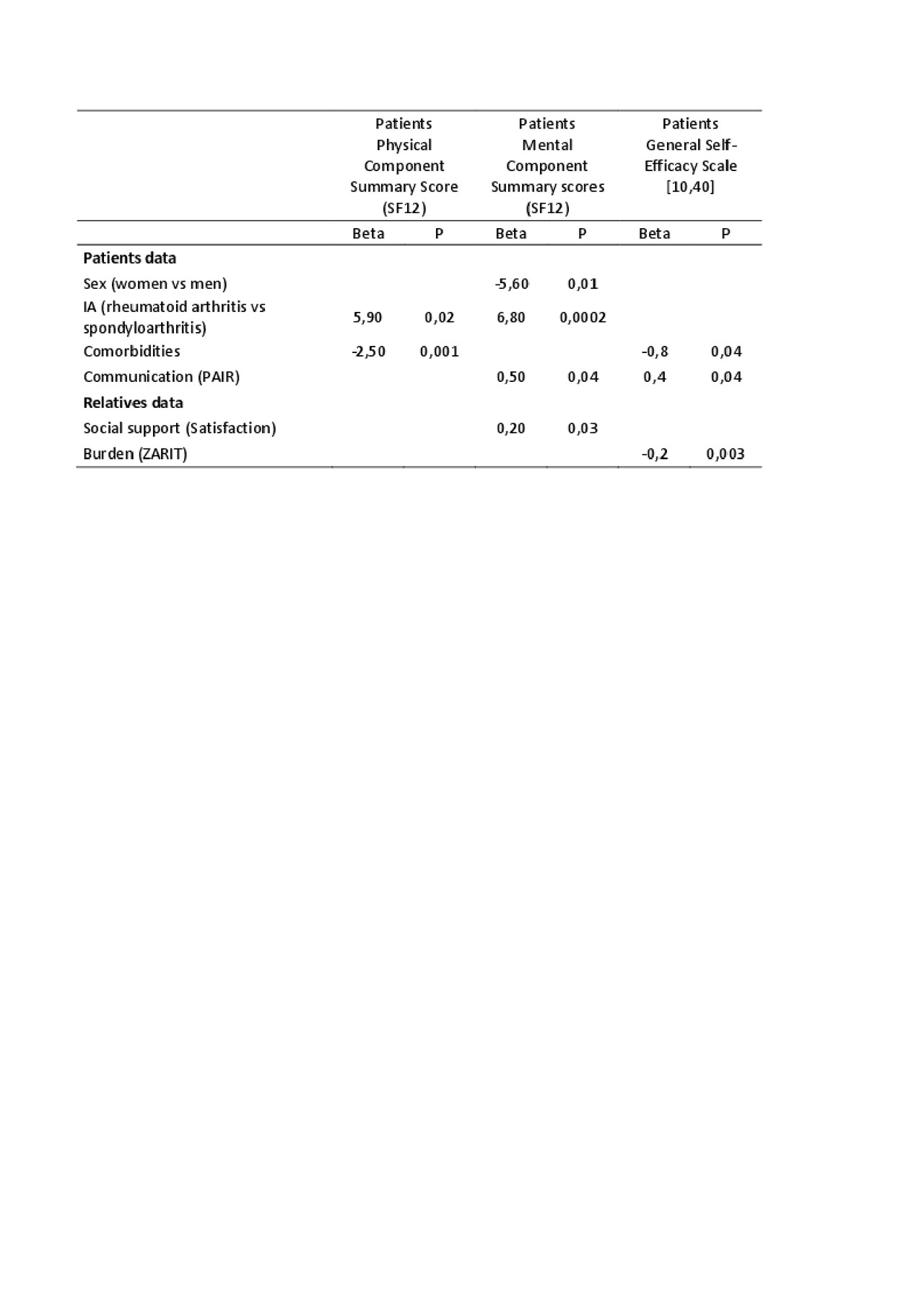Session Information
Session Type: ARP Abstract Session
Session Time: 2:30PM-4:00PM
Background/Purpose: Relatives’ and patients’ adjustment to a chronic disease is complex, and there is room for improvement in the support provided to the dyad. So far, few studies have studied the impact of the characteristics of the caregiver and of the relationship within the couple simultaneously. Moreover, studies focused on rheumatoid arthritis (RA), not on spondyloarthritis (SpA), and were realized before biologics.
We aimed to analyze the impact of patient’s caregiver and patient-caregiver relationship on functional impairment, mental health and self-efficacy of the patient with RA or SpA.
Methods: Study design: observational cross-sectional study.
Inclusion criteria: age ≥18 years old; diagnosis of RA or SpA; spouse consent. Exclusion criteria: major comorbidity. Participants were recruited by rheumatologists during their consultations in seven rheumatology departments and by a patient association.
Outcome criteria: functional impairment and mental health measured by the SF12 (Physical and Mental Component Summary scores) and self-efficay by the General Self-Efficacy Scale.
Potential determinants: Caregiver-patient relationship was assessed by the personal assessment of intimacy in relationships (PAIR) questionnaire (scores: communication, engagement, shared friends) and the Dyadic Adjustment Scale (DAS)(scores: degree of agreement, quality of the interactions), social support by the Social Support Questionnaire SQ6, burden by the Zarit questionnaire and comorbidities by the groll index.
Results: A total of 88 patient–relative dyads were included. Patients were mostly female (N=68, 77%), mean age 59 (SD 12.6) years old, 69% had RA, mean disease duration 16 (range 1-63) years, mean age of caregivers 60 (SD 13,5) years old, 35 (45%) were still in work.
In bivariate analyses, relatives’ burden (and patients type of IA and comorbidities) were associated with patients functional impairment.
Patients’ social Support (satisfaction scores), dyad relationship (PAIR communication and engagement scores, DAS degree of agreement and quality of the interactions scores assessed by patients) (and patients age, sex, IA), were associated with patients mental health.
Relatives burden, social support (satisfaction scores), relatives anxiety and depression, dyad relationship (PAIR communication score and DAS degree of agreement assessed by patients) (and patients comorbidities) were associated with self-efficacy.
In multivariate analyses (table), good communication in the couple, satisfaction with social support and low relative burden were independently associated with improved patients mental health and perceived self-efficacy.
Conclusion: This study has highlighted that mental health and self-efficacy of patients with IA are not only influenced by
patient-relative relationship, but also by the perceived satisfaction of social support of the couple, the perceived burden of the relative and by relative anxiety and depression.
Intervention targeting relatives should be part of self-management programs of patients with IA.
To cite this abstract in AMA style:
Brignon M, Beauvais C, Beranger M, Cohen J, Griffoul I, Le Quintrec J, Poivret D, Thevenot C, Trope S, Rat A. Patients and Relatives Coping with Inflammatory Arthritis: Impact of Communication, Social Support and Relatives Burden on Patients Perceived Health [abstract]. Arthritis Rheumatol. 2019; 71 (suppl 10). https://acrabstracts.org/abstract/patients-and-relatives-coping-with-inflammatory-arthritis-impact-of-communication-social-support-and-relatives-burden-on-patients-perceived-health/. Accessed .« Back to 2019 ACR/ARP Annual Meeting
ACR Meeting Abstracts - https://acrabstracts.org/abstract/patients-and-relatives-coping-with-inflammatory-arthritis-impact-of-communication-social-support-and-relatives-burden-on-patients-perceived-health/

